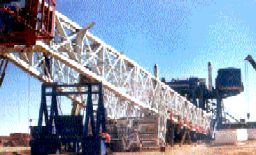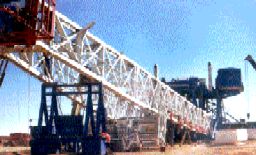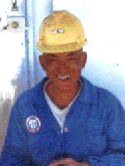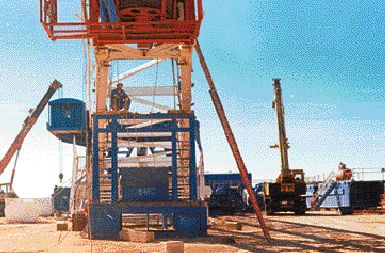
Quest for the Truth in Fleinbergs Kidnapping [Archives:2001/04/Reportage]
January 22 2001
Report by
Hassan Al-Zayidi
Yemen Times
It all started when we heard of the news of a German expert kidnapped in Shabwa governorate on Wednesday afternoon. I immediately called the editor-in-chief to inform him of what had happened and to get the green light for a long journey to find out the truth. Who kidnapped him? Where? Why? Plus many other relevant questions needed a quick answer, as for the press, time is invaluable. I slept that Wednesday after planning my trip to the remote region, where the kidnapping took place. I woke up the next day (Thursday January 18) and headed to the YT office, where I described my plan to the editor. After getting his final approval to start the journey, I went back home and packed my stuff for at least a three-day journey to the heart of Shabwa governorate. Once I stepped out of my home, I realized it is a tough task, but I love challenges, that is why I decided to take this particular challenge.

After 6 long hours, we arrived in Hileywa, the region where there exists many fields for Jennah Hunt-Yemen Oil Company. Later on, we reached Obad, where we found one of the fields of the Saudi oil production company, Al-Namir. Seventy kilometers away from there, we finally arrived to the exploration site of the German company Peussag Energie, in an area called Al-Uqla.

I told him that we had come to get more in-depth information from the staff or workers of what exactly happened when the German expert was kidnapped. One of the Chinese workers (whose photo is shown) explained that he only heard that the head of the operations team of the exploration unit, Mr. Feilenberg was kidnapped the other day by tribesmen while he walked out of the camp. By then, none of the workers knew his fate. As I continued to listen to our Chinese friend, it was so difficult for me to understand a word of what he said. I later talked to other workers, who told me that they did not see for themselves how the incident happened, all they were told is that they should continue working without any interruption. I learnt from them that the number of workers was around 60, all foreigners, and all working on exploring the possibility of oil fields in that area. They said that they may need to dig for six more months before they could know whether there is oil there or not.
After thanking the workers for their little information, I took photos of the location, the desert, just to show our readers how difficult it would be for anyone to hide or run in such difficult circumstances. There were no mountains to hide in, where could they have taken the hostage? I wondered.

We asked mediators how things were going, they stated that negotiations were continuing, and there was no indication whatsoever if he would be released that day (Friday).
We asked the kidnappers why they did what they did. Their answer was clear and short: They preferred to bring other workers from the Nessiyyeen tribe to work for the company in our region. We cannot accept this. If there are any employment opportunities, our tribesmen are more eligible for these jobs, after all, it is our land. Our tribe, Al-Kurab, which is a Bedouin tribe, most of whose members live in tents and dominate most of the areas of Al-Uqla, Asakir, Al-Usailat, and Jarwan.
We tried to get into the exact area where the kidnappers were holding the hostage, but were not allowed in by the tribesmen who had bazookas hanging over their shoulders. After trying extensively to work out a deal with the guards to let us in in exchange for whatever they wanted, all we got was a threat of them shooting us with their automatic rifles. So, we realized that we were no match for them and quietly went away.
Friday evening, we were surprised to find out that the negotiations had failed, and Ba Haisami decided to cancel further negotiations and return to the city of Attaq.
Realizing that the kidnapping will take longer than expected, we also went to Attaq to further contact the Shabwa Governor and other security officials concerned. There, a prominent security official stated that there are political motives behind the kidnapping incident but provided no more information.
We also met with Mr. Ahmed Al-Rassas, Governor of Shabwa, who told us that negotiations had resumed by sending Sheikh Salim bin Hamad Jalal, along with the Chief of the Military Region. Awadh bin Fareed.
Fortunately, the kidnappers were persuaded to release the hostage after some commitments had been given by Awadh bin Fareed, who is a trusted person in the tribal community for his previously successful mediation efforts, which resulted in an agreement of having members of both rival tribes, Al-Kurab and Nasiyyeen employed in the company. The hostage was finally released on Saturday morning, and taken to the companys Sanaa branch.
In the Sanaa branch, I talked with the General Manager, who stressed the importance of not creating any confusion or chaos in regard to the companys stand in Yemen, and hence did not allow us to interview Mr. Feilenberg.
It is worthy to mention that Preuassag Energie had started oil exploration in the Uqla region at the end of last year, despite the fact that they had been received with gunfire on arrival on the first day, according to reliable tribal sources.
We were able to obtain photos of Lothar Fielenberg, who is the 23rd German abducted in Yemen since 1996, and the 151st foreigner kidnapped since the same year, during our visit to the companys main branch in Sanaa.
Shabwa governorate has witnessed the arrival and leaving of many companies working on exploring oil in the region. Despite the common belief among tribesmen that there exists plenty of oil in the region, many companies have concluded otherwise. Among the companies that left the governorate was Al-Namir Petroleum, which is owned by Saudi investors, which declared its withdrawal from the area where it was operating a few weeks ago.
——
[archive-e:04-v:2001-y:2001-d:2001-01-22-p:./2001/iss04/report.htm]


